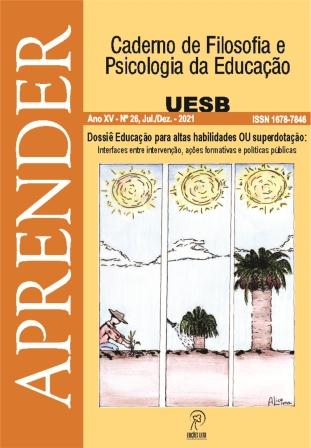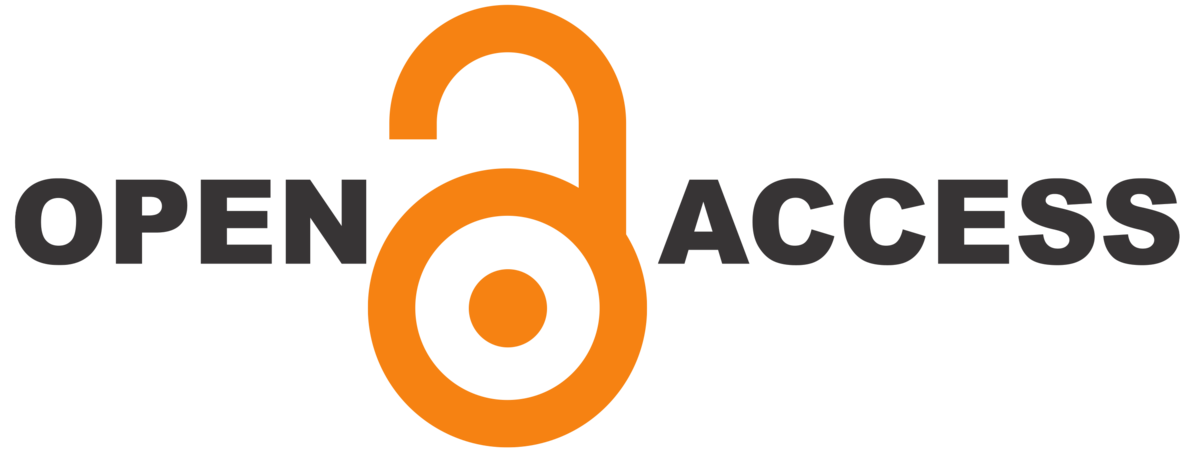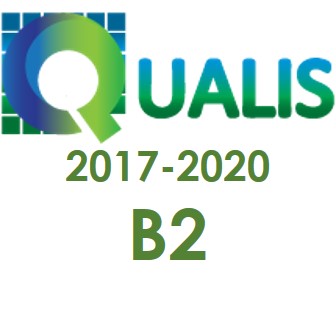ATENDIMENTO ÀS NECESSIDADES SOCIOEMOCIONAIS DE ESTUDANTES COM DUPLA EXCEPCIONALIDADE: REVISÃO INTEGRATIVA DA LITERATURA INTERNACIONAL
DOI:
https://doi.org/10.22481/aprender.i26.10042Palavras-chave:
Dotação e talento, Dupla excepcionalidade, Estudantes duplamente excepcionais (2E)Resumo
Estudos sobre a dupla excepcionalidade têm aumentado na literatura da educação de dotados e talentosos. Estudantes duplamente excepcionais (2E) demonstram capacidades elevadas em uma ou mais áreas associadas a uma deficiência ou transtorno/distúrbio ou síndrome e necessitam de intervenções socioemocionais e acadêmicas que atendam as duas excepcionalidades. O objetivo deste artigo é apresentar as práticas de atendimento, no âmbito socioemocional, para esse público ao realizar uma revisão integrativa da literatura internacional, publicada de 2018 a 2020. Foram encontrados treze artigos (N=13). Desse total, apenas quatro (N=4) foram resultados de pesquisas empíricas. Os resultados apontaram que: (i) os estudantes 2E necessitam de diversos apoios, na escola e na família, visando ao desenvolvimento cognitivo, social e emocional; (ii) há poucas evidências empíricas sobre intervenções específicas para esse público; (iii) as intervenções, no âmbito socioemocional, são necessárias não só para o bem-estar socioemocional dos estudantes 2E como também para a melhoria do desempenho acadêmico; (iv) as intervenções efetivas devem ser focadas nos talentos e nos potenciais e, ao mesmo tempo, oferecer apoio para as necessidades acadêmicas e socioemocionais. Conclui-se que são necessárias pesquisas empíricas com intervenção que possam estabelecer relações causais entre as estratégias e os resultados para o desenvolvimento socioemocional desses estudantes.
Downloads
Referências
AMRAN, Hannah; MAJID, Rosadah. Learning strategies for twice-exceptional students. International Journal of Special Education, v. 33, n.4, p. 954-976, 2019. Disponível em: https://files.eric.ed.gov/fulltext/EJ1219411.pdf. Acesso em: 05 jun.2021.
BALDWIN, Lois; BAUM, Susan; PERELES, Daphne; HUGHES, Claire. Twice-exceptional learners: the journey toward a shared vision. Gifted Child Today, v. 38, n. 4, p. 206-214, 2015. Disponível em: http://sagepub.com/journalsPermissions.nav. Acesso em: 15 abr. 2018.
BAUM, Susan. Introduction to twice-exceptional and special populations of gifted students. In BAUM, S. (Ed.). Twice-exceptional and special populations of gifted students. USA: National Association for Gifted Children, 2004, p. 23-33.
BAUM, Susan; SCHADER, Robin; HÉBERT, Thomas. Through a different lens: reflecting on strengths-based, talent-focused approach for twice-exceptional learners, Gifted Child Quarterly, v. 58, n. 4, p. 311-327, 2014. Disponível em: https://sci-hub.tw/https://doi.org/10.1177/0016986214547632. Acesso em: 29 mar. 2020.
BAUM, Susan; SCHADER, Robin; OWEN, Steven. To be gifted and learning disabled: strenght-based strategies for helping twice- exceptional students with LD, ADHD, ASD, and more. USA: Waco, TX: Prufrock Press, 2017.
BAUM; Susan; SCHADER, Robin. Twice-exceptionality: a field whose time has come. In: FUGATE, Matthew; BEHRENS, Wendy; BOSWELL, Cecelia. Understanding twice-exceptional learners: connecting research to practice. United States: Prufrock Press, 2020, p. 7-31.
BESNOY, Kevin; SWOSZOWSKI, Nicole; NEWMAN, Jane; FLOYD, Amanda; JONES, Parrish; BYRNE, Caitlin. The advocacy experiences of parents of elementary age, twice-exceptional children, Gifted Child Quarterly, v. 59, p. 108-123, 2015. Disponível em: https://sci-hub.se/https://doi.org/10.1177%2F0016986215569275. Acesso em: 18 jun. 2021.
BRASIL. Decreto 7.611/2011. Dispõe sobre a educação especial, o atendimento educacional especializado e dá outras providências. Brasília: MEC, 2011. Disponível em: http://www.prograd.ufu.br/sites/prograd.ufu.br/files/media/documento/8.6_-_decreto_ndeg_7.611-11_-_acessib.pdf . Acesso em: 01 ago. 2018.
CALLAHAN, Carolyn; MOON, Tonya. Sorting the wheat from the chaff: what makes for good evidence of effectiveness in the literature in gifted education?, Gifted Child Quarterly, v. 51, p. 305-319, 2007. Disponível em: https://sci-hub.se/https://doi.org/10.1177%2F0016986207306317. Acesso em: 24 jun. 2021.
COLEMAN, Mary Ruth; GALLAGHER, Shelagh. Meeting the needs of students with 2E: it takes a team. Gifted Child Today, v. 38, n. 4, p. 252-254, 2015. Disponível em: https://sci-hub.tw/https://doi.org/10.1177%2F1076217515597274. Acesso em: 12 mar. 2019.
CORDEIRO, Alexander; OLIVEIRA, Gloria Maria de; RENTERÍA, Juan Miguel; GUIMARÃES, Carlos Alberto. Revisão sistemática: uma revisão narrativa. Rev. Col. Bras. Cir., v. 34, n. 6, p. 428-431, 2007. Disponível em: https://www.scielo.br/j/rcbc/a/CC6NRNtP3dKLgLPwcgmV6Gf/?format=pdf&lang=pt. Acesso em: 25 mar. 2021.
FOLEY-NICPON, Megan; ALLMON, Allison; STINSON, Rebecca; SIECK, Barbara. Empirical Investigation of Twice-Exceptionality: Where Have We Been and Where Are We Going?, Gifted Child Quarterly, v. 55, n. 1, 2011, p. 3–17. Disponível em: http://gcq.sagepub.com. Acesso em: 15 abr. 2018.
FOLEY-NICPON, Megan; ASSOULINE, Susan; COLANGELO, Nicholas. Twice-Exceptional Learners: who needs to know what?, Gifted Child Quarterly, v. 57, n. 3, p. 169–180, 2013. Disponível em: https://sci-hub.se/https://doi.org/10.1177%2F0016986213490021. Acesso em: 18 jun. 2020.
FOLEY-NICPON, Megan; ASSOULINE, Susan. Counseling considerations for the twice-exceptional client, Journal of Counseling & Development, v. 93, n. 2, p. 202-211, 2015. Disponível em: https://sci-hub.se/https://doi.org/10.1002/j.1556-6676.2015.00196.x. Acesso em: 21 jun. 2021.
FOLEY-NICPON, Megan. The social and emotional development of twice-exceptional children. In: NEIHART, Maureen; PFEIFFER, Steven; CROSS, Tracy (Eds.). The social and emotional development of gifted children: what do we know?.Texas: Prufrock Press Inc Waco, 2016, p. 103-118.
FOLEY-NICPON, Megan; ASSOULINE, Susan. High ability students with coexisting disabilities: implications for school psychological practice, Psychology in the Schools, p. 1-12, 2020. Disponível em: https://sci-hub.se/https://doi.org/10.1002/pits.22342. Acesso em: 15 maio 2021.
GAGNÉ, Francoys. Giftedness and talent: reexamining a reexamination of the definitions, Gifted Child Quarterly, v. 29, n.3, p.103-112, 1985. Disponível em: https://www.researchgate.net/publication/254092876_Giftedness_and_Talent_Reexamining_a_Reexamination_of_the_Definitions. Acesso em: 10 jun. 2019.
KAUFMAN, Scott Barry. Twice exceptional: supporting and educating bright and creative students with learning difficulties. Canada: Oxford University Press, 2018.
KING, Emily Willians. Addressing the social and emotional needs of twice-exceptional students. TEACHING Exceptional Children, v. 38, n.1, p. 16-20, 2005. Disponível em: https://sci-hub.se/https://doi.org/10.1177%2F004005990503800103. Acesso em: 15 maio 2021.
LEE, Chin-Wen; RITCHOTTE, Jennifer. Seeing and supporting twice-exceptional learners. The Educational Forum, v. 82, n.1, p. 68-84, 2018. Disponível em: https://sci-hub.se/https://doi.org/10.1080/00131725.2018.1379580. Acesso em: 15 maio 2021.
LEE, Chin-Wen; RITCHOTTE, Jennifer. A case study evaluation of the implementation of twice-exceptional professional development in Colorado, Journal for the Education of the Gifted, p. 1-26, 2019. Disponível em: https://sci-hub.se/https://doi.org/10.1177%2F0162353219874440. Acesso em: 15 maio 2021.
LEROUX, Janice; LEVITT‐PERLMAN, Marla. The gifted child with attention deficit disorder:An identification and intervention challenge. Roeper Review, v. 22, n. 3, p. 171–176, 2000. Disponível em: https://sci-hub.se/https://doi.org/10.1080/02783190009554028. Acesso em: 18 jun. 2018.
LOVECKY, Deirdre. Different minds: gifted children with AD/HD, Asperger Syndrome, and other learning deficits. London: Jessica Kingsley Publishers, 2004.
MAYES, Renae; HINES, Erik; BIBBS, Deidra; RODMAN, Jennifer. Couselors and psychologists mentoring gifted black males with disabilities to foster college and career readiness, Gifted Child Today, v.42, n.3, p. 157-164, 2019. Disponível em: https://sci-hub.se/https://doi.org/10.1177%2F1076217519843150. Acesso em: 15 maio 2021.
MAYES, Renae. College and career readiness groups for gifted black students with disabilities, The Journal for Specialists in Group Work, v.45, n. 3, p. 200-212, 2020. Disponível em: https://sci-hub.se/https://doi.org/10.1080/01933922.2020.1789790. Acesso em: 17 jun. 2021.
MOHAMMED, Amra. Twice-exceptionality in the Kingdom of Saudi Arabia: policy recommendations for advances in Special Education, International Journal Of Special Education, v. 33, n. 2, p. 397-415, 2018. Disponível em: https://files.eric.ed.gov/fulltext/EJ1185585.pdf. Acesso em: 15 maio 2021.
NEIHART, Maureen. Identifying and providing services to twice exceptional children. In: PFEIFER, Steven (Ed.). Handbook of giftedness in children: psycho-educational theory, research, and best practices.USA: Springer, 2008, p. 115-137.
OWENS, Charissa Owens; FORD, Donna; LISBON, April; OWENS, Michael. Shifting paradigms to better serve twice-exceptional african-american learners, Behavioral Disorders, v. 41, n. 4, p. 196-208, 2016. Disponível em: https://sci-hub.se/https://doi.org/10.17988%2Fbedi-41-04-196-208.1. Acesso em: 20 maio 2021.
PARK, Soeun; FOLEY-NICPON, Megan; BOLENBAUGH, Mallory; CHOATE, Alyssa. “Nothing fits exactly”: experiences of Asian American parents of twice-exceptional children, Gifted Child Quarterly, p. 1-14, 2018. Disponível em: https://sci-hub.se/https://doi.org/10.1177%2F0016986218758442. Acesso em: 16 jun. 2021.
RANGNI, Rosemeire; COSTA, Maria Piedade. Altas Habilidades/superdotação e deficiência: reflexões sobre o duplo estigma, Educar em Revista, 53, 187-199, 2014. Disponível em: https://doi.org/10.1590/0104-4060.33859. Acesso em: 10 jun. 2021.
REIS, Sally; BAUM, Susan; BURKE, Edith. An Operational Definition of Twice- Exceptional Learners: Implications and Applications, Gifted Child Quarterly, v. 58, n. 3, 2014, p. 217–230. Disponível em: http://journals.sagepub.com.ez31.periodicos.capes.gov.br/doi/pdf/10.1177/0016986214534976. Acesso em: 15 abr. 2018.
REIS, Sally; RENZULLI, Sara. Parenting for strenghts: embracing the challeges of raising children identified as twice exceptional, Gifted Education International, p. 1-13, 2020. Disponível em: https://sci-hub.se/https://doi.org/10.1177%2F0261429420934435. Acesso em: 16 jun. 2021.
RENZULLI, Sara; GELBAR, Nicholas. Leadership roles for school counselors in identifying and supporting twice-excepctional (2E) students, Professional School Counseling, v. 23, n. 1, p. 1-11, 2020. Disponível em: https://sci-hub.se/https://doi.org/10.1177%2F2156759X20940636. Acesso em: 15 maio 2021.
RITCHOTTE, Jennifer; ZAGLAWAN, Hasan. Coaching parentes to use higher level questioning with their twice-exceptional children, Gifted Child Quarterly, p.1-16, 2019. Disponível em: https://sci-hub.se/https://doi.org/10.1177%2F0016986218817042. Acesso em: 17 jun. 2021.
LIN, Chin-Lan; FOLEY-NICPON, Megan. Integrating creativity into career interventions for twice exceptional students in the United States: a review of recent literature, Gifted and Talented International, Disponível em: https://sci-hub.se/https://doi.org/10.1080/15332276.2019.1704667. Acesso em: 17 jun. 2021.
SCORSOLINI-COMIN, Fábio; SANTOS, Manoel. Psicologia Positiva e os Instrumentos de Avaliação no Contexto Brasileiro, Psicologia: Reflexão e Crítica, v. 23, n. 3, p. 440-448, 2010. Disponível em: https://www.scielo.br/j/prc/a/QLdLwrhpwV9WJXrcPCTPV9v/abstract/?lang=pt. Acesso em: 01 jul. 2021.
SEVERINO, Antônio. Metodologia do trabalho científico. 22.ed. São Paulo: Cortez, 2002.
SOUZA, Marcela; SILVA, Michelly; CARVALHO, Rachel. Revisão integrativa: o que é e como fazer. Einsten, São Paulo, v. 8, n. 1, p. 102-106, 2010. Disponível em: https://www.scielo.br/j/eins/a/ZQTBkVJZqcWrTT34cXLjtBx/?format=pdf&lang=pt. Acesso em: 20 maio 2021.
STETLER, Cheryl; MORSI, Deborah; RUCKI, Sheila Brought; CORRIGAN, Barbara; FITZGERALD, Jan; GIULIANO, Karen; HAVENER, Patricia; SHERIDAN, Ann. Utilization-focused integrative reviews in a nursing service, Applied Nursing Research, v. 11, n. 4, p. 195-206, 1998. Disponível em: https://www.researchgate.net/publication/13434441_Utilization-focused_integrative_reviews_in_a_nursing_service. Acesso em: 14 mar. 2021.
TRAIL, Beverly. Twice-exceptional gifted children: understanding, teaching and counseling gifted students. USA: Prufrock Academic Press, 2011.
WEBB, James; AMEND, Edward; BELJAN, Paul; WEBB, Nadia; KUZUJANAKIS, Marianne; OLENCHAK, Richard; GOERSS, Jean. Misdiagnosis and dual diagnoses of gifted children and adults: ADHD, Bipolar, OCD, Asperger´s, Depression, and other disorders. 2. ed. Tucson, AZ: Great Potential Press, 2016.
WHITTEMORE, Robin; KNAFL, Kathleen. The integrative review: updated methodology, Journal of Advanced Nursing, v. 52, n. 5, p. 546-553, 2005. Disponível em: https://citeseerx.ist.psu.edu/viewdoc/download?doi=10.1.1.465.9393&rep=rep1&type=pdf. Acesso em: 15 maio 2021.
WU, I-Chen; LO, Owen; TSAI, Kuei-Fang. Learning experiences of highly able learners with ASD: using a success case method, Journal for the Education of the Gifted, v. 42, n. 3, p.216-242, 2019. Disponível em: https://sci-hub.se/https://doi.org/10.1177%2F0162353219855681. Acesso em: 15 maio 2021.
Downloads
Publicado
Como Citar
Edição
Seção
Licença
Copyright (c) 2021 APRENDER - Caderno de Filosofia e Psicologia da Educação

Este trabalho está licenciado sob uma licença Creative Commons Attribution-ShareAlike 4.0 International License.












